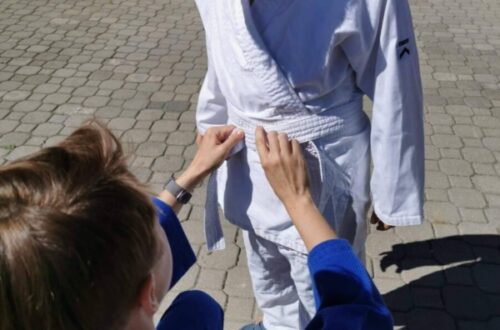
Szanuj sensei swego!|Respect your sensei!
W Polsce istnieje kult słowa „sensei„. Tylko, niestety, za tym pojęciem nie stoi ten mądry, doświadczony mistrz, który nie dość, że trenuje całe życie to jeszcze ma charakter ze stali, a kodeks budo wyryty w mózgu.
Przyjęło się, że sensei to instruktor japońskich sztuk walki. Po prostu. Dlatego każdego posiadacza czarnego pasa nazywa się sensei.
Mylne, niezrozumiałe i szczerze mówiąc skomplikowane.
Kim jest sensei?
Czy sensei odnosi się tylko do nauczycieli?
Czy są inne sposoby tytułowania nauczyciela?
Miałam przyjemność rozmawiać na ten temat z kilkoma Japończykami, i w końcu udało mi się dotrzeć do istoty tego nieszczęsnego słowa jakim jest „sensei”.
Sensei [先生] wywodzi się od ideogramów: [先], co oznacza „przed” i „wiedzieć”, oraz [生], co oznacza „narodziny” i „życie”. Dosłownie znaczy „ten, który wcześniej przyszedł”. Czyli starszy, znacznie bardziej doświadczony, o większej wiedzy.
Wskazuje to, że nazywanie kogoś sensei jest potwierdzeniem doświadczenia tej osoby w określonym obszarze.
Podobnie jak senpai, nie można nazywać siebie sensei, na ten tytuł trzeba sobie zapracować.
Przedstawienie siebie jako „sensei” można porównać do nazywania siebie „panem Krzysztofem”, „sir Nicholas’em” etc. Wskazuje przede wszystkim na przerost formy nad treścią.
Niektórzy używają określenia shisho, aby nazwać kogoś nauczycielem, słowo to odnosi się do osoby wykwalifikowanej, utalentowanej, wykształconej. Może to być trener, rzemieślnik, artysta, ponieważ ideogramy dosłownie oznaczają, że dana osoba jest ekspertem w jakimś fachu.
Innym bardzo popularnym słowem jest kyoshi, które dosłownie oznacza nauczyciela w klasie i odnosi się do zawodu, a nie tytuł honorowego.
Bardziej wszechstronną alternatywą jest kyoshu, używane jako rzeczownik dla nauczyciela, instruktora i mentora obejmującego inne obszary poza klasą.
Sensei można się zwrócić do starszej osoby, nauczyciela, doktora i każdego, kto jest na wyższym poziomie. Funkcjonuje jako zwrot grzecznościowy, trochę jak u nas „proszę pana”, „panie profesorze”. Jego użycie jest bardzo powszechne. Innymi słowy, możemy po prostu nazwać naszych nauczycieli i mentorów sensei.
Skoro znamy znaczenie słowa sensei, może spróbujmy pojąć jego istotę!
Nauczyciel to jeden z najpotężniejszych i najbardziej szanowanych zawodów w Japonii. Istnieje kilka kryteriów, które trzeba spełniać, by nim być. Trzeba budzić zaufanie w innych, być uczciwym i kierować się zasadami postępowania moralnego, etycznego i prawnego, być uprzejmym i spokojnym. Należy zawsze dawać przykład doskonałego zachowania, w każdej sytuacji.
Sensei to mentor o niezwykłej mądrości, autorytecie i wiedzy. Stawanie się nim to proces, a bycie nim to zaszczyt ale i obowiązek sprostania wielu zadaniom. Zwłaszcza ktoś, kto zajmuje się sztukami walki, powinien traktować to jako styl życia, a nie tylko pracę trenera. Powinien stawiać wymagania samemu sobie, dążyć do doskonałości.
Prawdziwy sensei jest kochany przez swoich uczniów, jest dla nich idolem, liderem. Chcą go naśladować.
A teraz na temat kompetencji i hierarchii.
W Polsce może być kilku sensei w jednym klubie i jest to najzupełniej normalnie praktykowane. A u Japończyków… U Japończyków sytuacja w dojo jest zupełnie inna.
Możesz mieć czarny pas i wykonywać bezbłędnie wszystkie techniki.
Możesz pomagać młodszym adeptom, pełnić różne obowiązki na sali.
Jednak jesteś jedynie uczniem z czarnym paskiem. Jesteś senpai.
Ponieważ w dojo może być tylko jeden sensei. Jak mawiają Japończycy – Sensei może być tylko jeden. Czyli sensei wa ichiri desu. Dodają jeszcze, że nie można spocząć, póki się nie odnajdzie swojego.
Ja zwykłam mawiać, że sensei jest jak kamień filozoficzny, ciężko go znaleźć.
Ale szukajmy!
There is a cult of the word „sensei” in Poland. Only, unfortunately, this concept is not supported by this wise, experienced master, who not only trains all his life, but also has a steel character, and the budo code is engraved in the brain.
It is assumed that sensei is just a Japanese martial arts instructor.
That is why every black belt holder is called a sensei. Confusing, incomprehensible and honestly – complicated.
Who is sensei?
Does the sensei only refer to teachers?
Are there any other ways of naming a teacher?
I had the pleasure of talking to a few Japanese people about it, and finally managed to get to the heart of this unfortunate word which is „sensei”. Sensei [先生] is derived from the ideographs: [先], which means „before” and „know”, and [生], which means „birth” and „life”.
Literally means „the one who came earlier”. So older, much more experienced, with more knowledge. This indicates that naming someone a sensei is a confirmation of that person’s experience in a particular area.
Like senpai, you cannot call yourself a sensei, you have to earn this title.
Introducing yourself as „sensei” can be compared to calling yourself „Mr. Christopher”, „Sir Nicholas” etc. It indicates, above all, the excess of form over content.
Some people use the term shisho to call someone a teacher, a word that refers to a skilled, talented, educated person.
It can be a trainer, craftsman, artist, because ideograms literally mean that the person is an expert in some trade.
Another very common word is kyoshi, which literally means classroom teacher and refers to a profession, not an honorary title.
A more comprehensive alternative is kyoshu, used as a noun for a teacher, instructor, and mentor covering other areas outside the classroom.
Sensei can be addressed to an elderly person, to a teacher, a doctor, and anyone who is of a higher level.
It functions as a polite expression, a bit like „sir”, „professor” in our case. Its use is very common. In other words, we can just name our teachers and mentors sensei.
Since we know the meaning of the word sensei, maybe let’s try to understand its essence!
The teacher is one of the most powerful and respected professions in Japan. There are several criteria that must be met in order to be one. You need to inspire trust in others, be honest and follow the rules of moral, ethical and legal behavior, be polite and calm. One should always set an example of perfect behavior in all situations.
Sensei is a mentor with extraordinary wisdom, authority and knowledge. Becoming one is a process, and being one is an honor but also a duty to fulfill many tasks. Especially someone who deals with martial arts should treat it as a lifestyle, not just a job as a trainer. He should make demands on himself, strive for perfection. A real sensei is loved by his students, he is an idol and a leader for them. They want to imitate him.
Now about competences and hierarchy.
In Poland, there can be several sensei in one club and it is practiced completely normally.
And for the Japanese… For the Japanese, the situation in the dojo is completely different.
You can have a black belt and perform all techniques flawlessly.
You can help younger adepts, perform various duties in the room.
However, you are only a black stripe student. You are a senpai.
Because there can only be one sensei in the dojo. As the Japanese say, there can only be one sensei. So sensei wa ichiri desu. They also add that you cannot rest until you find yours.
I used to say that sensei is like a philosopher’s stone, it’s hard to find.
But let’s look!
#sztukiwalki #trener #sensei





